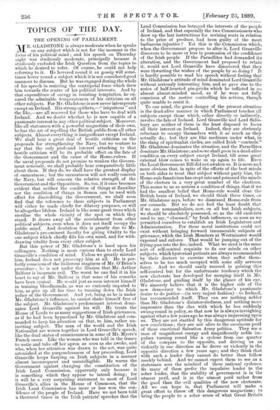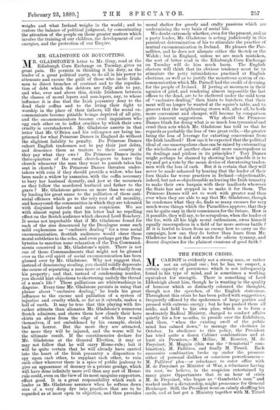TOPICS OF THE DAY.
THE OPENING OF PARLIAMENT.
1/1-R. GLADSTONE is always moderate when he speaks AL on any subject which is not for the moment in the focus of his political mind ; and his speech on Thursday night was studiously moderate, principally because it studiously excluded the Irish Question from the topics to which he desired to refer. Of course, he could not help referring to it. He hovered round it as gossip will some- times hover round a subject which it is not considered good manners to discuss. But he was engaged during the whole of his speech in resisting the centripetal force which drew him towards the centre of his political interests. And by that expenditure of energy in resisting temptation, he en- sured the admirable temperateness of his criticism on all other subjects. For Mr. Gladstone is now never intemperate except on Ireland. His strong epithets,—" iniquitous ' and the like,—are all reserved for those who have to deal with Ireland. And we doubt whether he is now capable of a passionate interest in any other political subject. Moreover, like all statesmen with a powerful magnetism of their own, he has the art of repelling the British public from all other subjects. Almost everything is insignificant except Ireland. We shall hear a great deal of hostile criticism on the proposals for strengthening the Navy, but we venture to say that the only profound interest attaching to that hostile criticism will be its probable effect on the fate of the Government and the cause of the Home-rulers. If the naval proposals do not promise to weaken the Govern- ment seriously, we shall probably hear comparatively little about them. If they do, we shall have the greatest display of earnestness ; but the earnestness will not really concern the Navy, but will concern the relative strength of the Government and the Opposition. So, too. if it once becomes evident that neither the condition of things at Zanzibar nor the condition of things in Samoa can be used with effect for discrediting the Government, we shall soon find that the reference to these subjects in Parliament will either be made chiefly for dilatory purposes, or will be altogether lifeless. Ireland is like some great trees which sterilise the whole vicinity of the spot on which they stand. It draws away all the nourishment from other political subjects, even when it does not itself occupy the public mind. And doubtless this is greatly due to Mr. Gladstone's pre-eminent faculty for giving vitality to the one subject which chiefly fills his own mind, and for with- drawing vitality from every other subject. But this power of Mr. Gladstone's is hard upon his colleagues. Nothing is more curious than to study Lord Granville's condition of mind. Unless we greatly mistake him, Ireland does not preoccupy him at all. He is per- fectly conscious of the ludicrous staginess of Mr. O'Brien's procedure ; he is not under the illusion that Mr. Arthur Balfour is incarnate evil. The worst he can find it in his heart to say of Mr. Balfour is that some of his remarks have been cynical. He would just as soon interest himself in training bloodhounds, as was so curiously imputed to him, as give up all his time to running down the Irish policy of the Government. And yet, being as he is under Mr. Gladstone's influence, he cannot shake himself free of the subject. Mr. Gladstone's predominant interest domi- nates Lord Granville against his will. He treats the House of Lords to as many suggestions of Irish grievances, as if he had been hypnotised by Mr. Gladstone and com- manded to keep his attention on that, to him, rather un- inviting subject. The man of the world and the Irish Nationalist are woven together in Lord Granville's speech, like the dual states of consciousness in some of Mr. Myers's French cases. Like the woman who was told in the trance to untie and take off her apron as soon as she awoke, and who, when her attention was drawn to the act, was quite astonished at the purposelessness of her proceeding, Lord Granville keeps harping on Irish subjects in a manner almost inconsequent and unintelligible. He warns the Government against changing the constitution of the Irish Land Commission, apparently only because it is something which they appear to intend doing; for it will be a very surprising statement to most of Lord Granville's allies in the House of Commons, that the Irish Land Commission has more or less won the con- fidence of the people of Ireland. Have we not been told a thousand times in the Irish patriots' speeches that the Land Commission has betrayed the interests of the people of Ireland, and that especially the two Commissioners who drew up the last instructions for revising rents in relation to the price of produce, had been guilty of the most barbarous injustice ? Yet this is the Commission which, when the Government propose to alter it, Lord Granville discovers to be more or less in possession of the confidence of the Irish people. If the Parnellites had demanded its alteration, and the Government had proposed to retain it, would not Lord Granville have discovered that they were thwarting the wishes of the people by so doing ? It is hardly possible to read his speech without feeling that Mr. Gladstone's attitude of mind dominated Lord Granville without seriously interesting him, and so gave rise to the series of half-hearted pin-pricks which he inflicted in an almost absent-minded mood, as if he were not fully conscious of the motive controlling his actions, though quite unable to resist it.
To our mind, the great danger of the present situation is the dead-alive manner in which Parliament touches all subjects except those which, either directly or indirectly, involve the fate of Ireland. Lord Granville and Lord Salis- bury are neither of them in the least disposed to focus all their interest on Ireland. Indeed, they are obviously reluctant to occupy themselves with it so much as they actually do ; but they are like mediums under what, in the slang of spiritualist circles, are called Irish "controls." Mr. Gladstone dominates the situation, and the Parnellites dominate Mr. Gladstone; and so we shall go on in a dead-alive condition on every subject except Ireland, till some great external blow comes to wake us up again to life. Even the Local Government Bill did not awaken us. It is more and more obvious that, in spite of the efforts of the best minds on both sides to treat that subject without party bias, the Home-rule fanaticism has crept into and poisoned the minds of the electors in a very great number of the elections. This seems to us so serious a condition of things, that if we had the smallest belief that Home-rule would clear the British brain of Ireland, we should think three times, as Mr. Gladstone says, before we dismissed Home-rule from our counsels. But we do not feel the least doubt that if we are somnambulists, now, on all but Irish subjects, we should be absolutely possessed, or, as the old exorcists used to say, " obsessed," by Irish influences, so soon as we permitted ourselves to establish an Irish Legislature and Administration. For these novel institutions could not exist without bringing forward innumerable subjects of grievance, which the Irish Members at Westminster would expound and enforce. That would be jumping out of the frying-pan into the fire, indeed. What we need is the same sort of self-control requisite to fix our minds on other subjects, which hysterical patients are always recommended by their doctors to exercise when they suffer them- selves to be too much occupied with some silly nervous fancy. And we should easily succeed in gaining this self-control but for the unfortunate tendency which the new electorate has developed for merging itself in Mr. Gladstone, and guiding itself by the glance of his eye. We sincerely believe that it is the higher side of the new democracy to which Mr. Gladstone's passionate desire to do justice—(in very unjust fashion)—to Ireland, has recommended itself. They can see nothing nobler than Mr. Gladstone's disinterestedness, and nothing more impressive than the edam with which he has suddenly swung round in policy, so that now he is always inveighing against what a few years ago he was always impressing upon us. They are not startled by this dangerous aptitude for new convictions ; they are not alive to the enormous peril of these emotional Salvation Army politics. They see a man of magnificent energy and magnificently noble im- pulses turning round like a cyclone from one quarter of the compass to the opposite, and driving us as violently in one direction as he drove us violently in the opposite direction a few years ago ; and they think that with such a leader they cannot do better than follow meekly behind. And we cannot expect them to see as a statesman sees the mischief of these national cyclones. So many of them prefer the impulsive leader to the sober leader, that the stability of government is in the utmost peril, and is in the utmost peril rather from the good than the evil qualities of the new electorate. All we can hope is, that Parliament will make a great effort to throw off this dangerous magnetism.; to bring the people to a sober sense of what Great Britain weighs and what Ireland weighs in the world ; and to restore the balance of political judgment, by concentrating the attention of the people on those greater matters which involve the training of our children, the development of our energies, and the protection of our Empire.



































 Previous page
Previous page